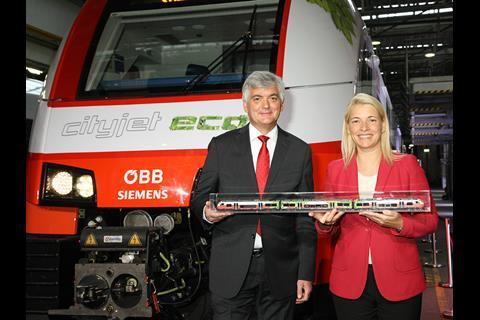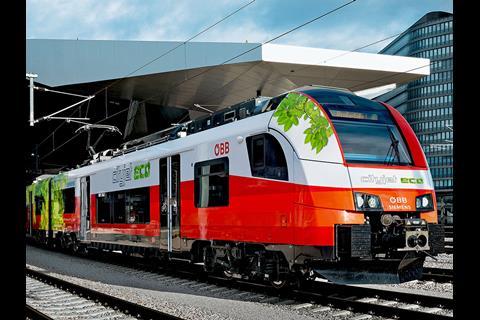AUSTRIA: An electric multiple-unit equipped with a prototype electric-battery hybrid drive system designed to enable through running onto non-electrified lines was unveiled by Siemens and Austrian Federal Railways in Wien on September 10.
The Desiro ML Cityjet Eco has been produced using a series-built version of the Desiro ML EMUs which Siemens is supplying to ÖBB. The middle car has been equipped with three battery containers with lithium-titanate batteries offering a total capacity of 528 kWh, chosen as they support higher charging currents and thus faster charging times than lithium-ion equivalents. The car also has two DC/DC controllers and a battery cooler to ensure the system is not affected by weather conditions.
The batteries are charged while the EMU is operating under 15 kV 16·7 Hz electrification. The unit switches to battery power as soon as it leaves the electrified route. The maximum speed is 140 km/h when using overhead power and 120 km/h with battery power.
Siemens expects that batteries for series production would have a lifetime of around 15 years, and so would only need replacing once during the entire service life of the train.
Batteries, hydrogen and hybrid traction are ‘becoming an increasingly important in our portfolio’, said Siemens Mobility CEO Sabrina Soussan. The Cityjet Eco offers ‘comparatively low investment costs’, Suossan said. The use of an off-the-shelf EMU design is expected to halve the 36 months typically needed to develop and produce a new train design.
The Desiro ML Cityjet Eco prototype is to be displayed at InnoTrans 2018 trade fair in Berlin this month, ahead of testing and further development to bring the system to maturity before its planned entry into passenger service in the second half of 2019.
‘We’re always looking for ways to improve our products and make them more environmentally friendly’, said Evelyn Palla of the ÖBB Personenverkehr management board. ‘As part of this quest, ÖBB will continue to focus on replacing diesel vehicles in the future.’



















